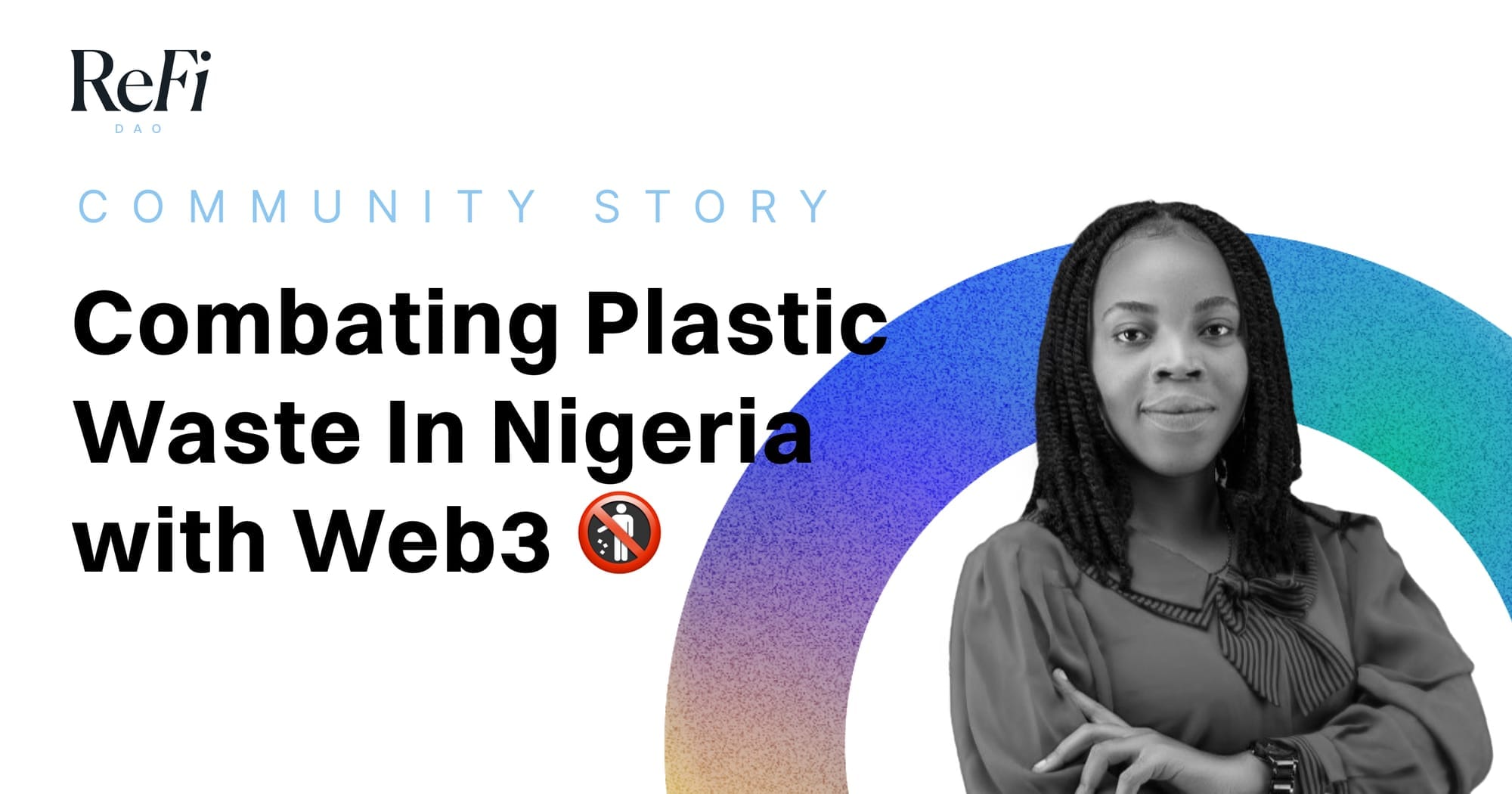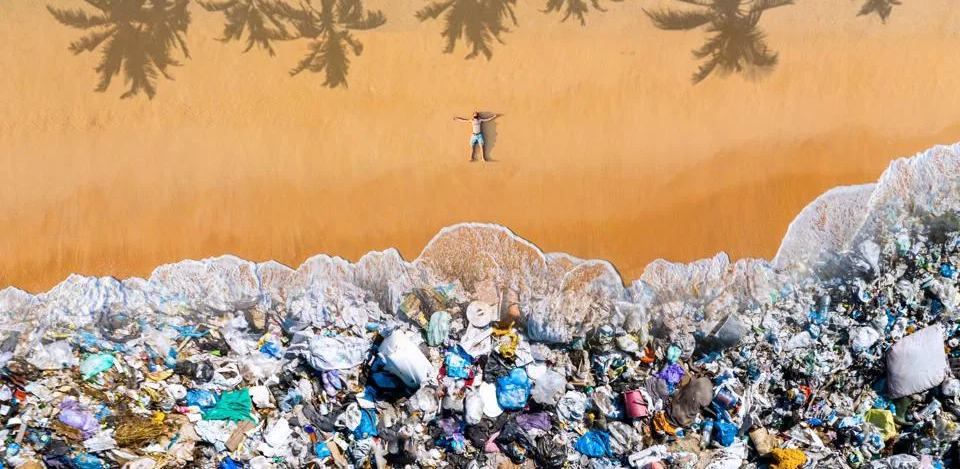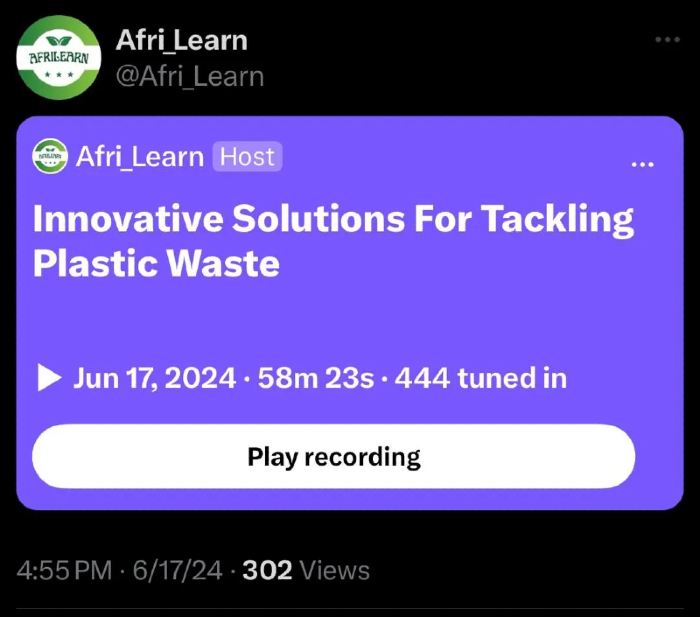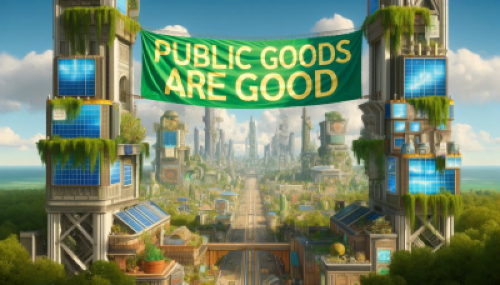Combating Plastic Waste In Nigeria with Web3 🚯
The pressing issue of plastic waste in Nigeria presents significant environmental and health impacts. Web3 and regenerative finance are turning these challenges into an opportunity for sustainable growth.

Nigeria faces a severe plastic waste crisis, contributing to environmental degradation and health risks. The challenges are exacerbated by inadequate infrastructure, illegal dumping, and rising urbanization. In this article Adaeze explores the transformative power of Web3 and regenerative finance (ReFi) in solving these issues.

A Global Challenge
The impact of climate change on our environment is profound and far-reaching, affecting every aspect of our lives. Rising global temperatures and increasingly erratic weather patterns are leading to more frequent and severe natural disasters, affecting food security, water resources, and public health. Plastic pollution exacerbates the effects of climate change by contributing to flooding, harming wildlife, and posing significant health risks to communities. Due to growing urbanization and increasing usage of plastics, managing these synthetic materials has become a global challenge. The breakdown of these larger plastic items into microplastics further complicates the issue, as these tiny particles can be ingested by marine and terrestrial animals, eventually finding their way into human food and water supplies. Globally, over 450 million tons of plastic waste are generated each year.

Nigeria is no exception. With over 200 million people and a growing urbanization, the country faces significant challenges in managing plastic waste. Nigeria ranks ninth among countries with the highest contributions to plastic pollution, producing over 2.5 million tons of plastic waste annually. Unfortunately, more than 88% of plastic waste created in Nigeria is not recycled. The most prevalent single-use plastics we encounter daily are food and beverage packaging.
Environmental and Health Impacts of Plastic Waste
Landfills are often overlooked, representing more than mere heaps of rubbish; they are major sources of harmful gases that exacerbate climate change. Daily, tons of household waste are deposited into landfills. Within these sites, a variety of discarded food, plastics, and other debris undergo a decomposition process that releases gases. According to a World Bank report, solid waste management accounted for approximately five percent of global emissions with methane emission being a key contributor, While the majority of oceanic plastic waste originates from land-based activities, an estimated 75 to 199 million tons are already present in marine environments. Studies suggest that tourist activities are the primary source of microplastics on most beaches in Lagos, Nigeria.

Problem Worth Solving: Indiscriminate Waste Disposal
Improper waste disposal is a significant issue in Nigerian cities, impacting public health, the environment, and urban aesthetics. Despite efforts to manage waste, several challenges hinder effective waste handling. One of the primary challenges is the inadequate waste management infrastructure. Many cities in Nigeria lack sufficient facilities for proper waste collection, recycling, and disposal, leading to waste being discarded illegally in open spaces, waterways, and streets. Coupled with this is the issue of insufficient funding. Waste management systems are frequently underfunded, restricting the state's capacity to effectively fight illegal dumping and preserve cleanliness. A significant factor that also contributes to illegal dumping is the lack of public awareness about its environmental and health impacts. Education and awareness campaigns are not widespread or effective enough to change public behavior. As a result, many individuals end up burning their waste thereby releasing harmful pollutants into the air, contributing to air pollution and posing serious health risks to residents, especially children and the elderly.
Addressing these challenges involves investing in modern waste management facilities, promoting public-private partnerships, and exploring decentralised climate solutions.

The Rise of Circular and Regenerative Economy
For decades, our global economy followed a linear trajectory, extracting raw materials, producing goods, and disposing of them once their usefulness has expired. This linear approach, while fostering economic growth, led to mountains of waste and the depletion of finite resources. A circular economy envisions a regenerative cycle where resources are used, reused, and regenerated. It promotes designing products for longevity, repairing and refurbishing, recycling materials, and ultimately reducing waste.

Innovations have emerged as pivotal solutions to address the growing challenge of plastic waste. Plastiks, a Web3 initiative, offers a reward system that ensures plastic waste is properly recovered and recycled. Plastiks also certifies that plastic waste is collected and recycled according to stringent standards. Using blockchain technology, all transactions and verifications are recorded on-chain, ensuring full transparency and trust. Funds from plastic credit sales are used to improve recovery infrastructure, provide fair wages, and support community projects.

Unlocking Climate Finance With Web3 and ReFi
In recent years, the world has witnessed an alarming increase in climate-related disasters, underscoring the urgent need for effective climate action. However, despite the growing recognition of the climate crisis, traditional climate finance mechanisms have struggled to keep pace with the scale of the problem. According to a report by the African Development Bank, the total cost of adapting to climate change in the continent is estimated to be between US$20 billion and US$30 billion per year. However, the actual amount of finance currently being provided for climate change adaptation and mitigation initiatives in the region is far below this estimate.
Regenerative finance (ReFi) — a decentralized finance built on regenerative principles- plays a pivotal role in scaling climate finance by supporting projects and businesses that prioritize resource efficiency, waste reduction, and societal regeneration. Web3 grant platforms such as Gitcoin and Giveth allocate funds to climate solutions and sustainable businesses working to reduce waste. These financial innovations promote public goods funding and on-chain capital allocation mechanisms such as quadratic funding (QF). On-chain capital allocation offers transparency, efficiency, and democratization, challenging traditional finance and scalability issues. Gitcoin grant has facilitated the distribution of more than $60 million to public goods in the Ethereum ecosystem

Exploring Opportunities and Use Cases in Nigeria
Plastic waste recycling is 10 billion dollar market in Nigeria. According to a report, studies show that only 14% of plastics are collected and recycled. Unfortunately, over 90% of the plastic waste generated in Nigeria is not recycled. Instead, much of it ends up in water bodies — rivers, lakes, drains, lagoons and the ocean. Here are some innovative startup tackling plastics pollution in Nigeria:
- Planet 3R is a social enterprise in Oyo, converting textile and plastic wastes into eco-friendly products using the 3R ( Reduce, Reuse, Recycle)
- Wecyclers is a social enterprise in Lagos incentivizing low-income communities to recycle their waste. In return, participants earn points that can be exchanged for essential goods and services.
- Waste Museum, the first of its kind in Africa, is dedicated to transforming waste into wealth. The Waste Museum recycles discarded materials and converts them into marketable products.

Another amazing project is Wasset, a Web3 platform rewarding plastic waste collection through its unique blockchain protocol and reward token ($WST). This reward system facilitates efficient waste collection and management.

“I hope that other young people will be able to save the environment with their hands too. The more wastepreneurs we have, the cleaner our environment becomes.” Adejoke Lasisi
💡 Conclusion - Going Forward
Tackling plastic pollution in Nigeria demands a comprehensive strategy that blends innovation, education, and efficient waste management. The current challenges, ranging from inadequate infrastructure to widespread illegal dumping, require urgent attention and systemic changes. Decentralized solutions like Plastiks and Wasset offer promising avenues for turning waste into valuable resources, ensuring transparency and trust with blockchain technology. Integrating regenerative finance principles to secure necessary funding, can enhance efforts and pave the way toward a more sustainable and cleaner environment, one city at a time.
👀 What's trending
🥳🎉 Gitcoin Grant 21 is live! Fund What Matters by contributing to projects that best reflect your vision for a regenerative future.

👉 Regen Cordi-Nation Genesis Round
👉 Climate Coordination Network Round
👉 Celo Real World Builders Round
👉 Decentralized Science (DeSci) Round
Be part of the SOLUTION, not the POLLUTION💚♻️🍀
Join us @ ReFi Lagos Let’s make a difference, together!

